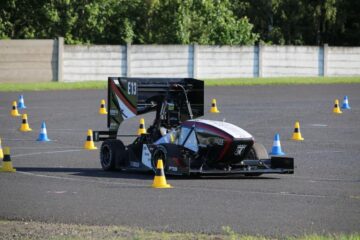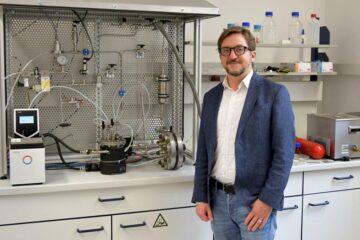noCap – AC Operable Class-D Amplifier

Related Art – Basically a Class D power amplifier compares an input voltage with a saw tooth reference. The comparison yields a pulse series with a duty cycle proportional to the present input voltage. A pair of solid state switches (e. g. MOSFETs, IGBTs) is driven by the pulse signals; the output of the power stage commonly is low pass filtered in order to eliminate the high frequency parts of the signal due to the reference.
The solid state switches are energized by a power supply comprising capacitors. A persistent challenge is the rating of these power supply capacitors: Especially for low frequency output signals down to DC the flyback energy due to the inductive components of low pass filter and load can charge the power supply capacitors up to voltages much greater than specified. To overcome rating problems the power supply capacitors are sometimes shunted by zener diodes. However, besides the additional circuitry efforts this measure causes additional heat losses. Thus, a more consequent solution would be desirable. Invention – Such a solution was recently developed at the Faculty of Process Engineering, Energy and Mechanical Systems at Cologne University of Applied Sciences. The innovative noCap technology not longer relies on power supply capacitors. The output stage switches moreover are immediately energized by an AC supply. With its novel power stage control method noCap maintains the outstanding power efficiency known from other Class-D designs. Beyond that there is neither a need for commonly utilized power supply capacitors, nor for a separate power supply at all: noCap quasi comprises its own switching power supply. Therefore a considerable gain in circuit package density can be achieved.
Weitere Informationen: PDF
PROvendis GmbH
Tel.: +49 (0)208/94105 10
Ansprechpartner
Dipl.-Ing. Alfred Schillert
Media Contact
Alle Nachrichten aus der Kategorie: Technologieangebote
Neueste Beiträge

Ideen für die Zukunft
TU Berlin präsentiert sich vom 22. bis 26. April 2024 mit neun Projekten auf der Hannover Messe 2024. Die HANNOVER MESSE gilt als die Weltleitmesse der Industrie. Ihr diesjähriger Schwerpunkt…

Peptide auf interstellarem Eis
Dass einfache Peptide auf kosmischen Staubkörnern entstehen können, wurde vom Forschungsteam um Dr. Serge Krasnokutski vom Astrophysikalischen Labor des Max-Planck-Instituts für Astronomie an der Universität Jena bereits gezeigt. Bisher ging…

Wasserstoff-Produktion in der heimischen Garage
Forschungsteam der Frankfurt UAS entwickelt Prototyp für Privathaushalte: Förderzusage vom Land Hessen für 2. Projektphase. Wasserstoff als Energieträger der Zukunft ist nicht frei verfügbar, sondern muss aufwendig hergestellt werden. Das…

















